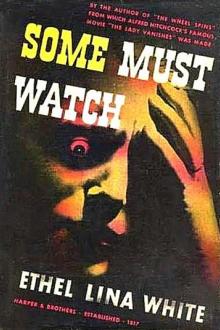Some Must Watch - Ethel Lina White (best book club books .TXT) 📗

- Author: Ethel Lina White
- Performer: -
Book online «Some Must Watch - Ethel Lina White (best book club books .TXT) 📗». Author Ethel Lina White
“I understand your feelings, Newton,” he said. “But I think the chances
are against your—maniac being outside in this storm. If he’s not back
in his home, he will be sheltering in some barn. I am sure Simone will
reach the Bull safely.”
“What a happy prospect.” Newton bit his lip. “All the more reason for
her husband to be there.”
“Perhaps you’re right. But before you go we’d better discuss our line of
procedure. We want to avoid a scandal”
“I don’t want to divorce Simone.” Newton’s voice cracked, “I only want
to get her away from that—from Rice.”
“Personally, I think she is in no danger from Rice,” remarked the
Professor. “He is very definitely not an amatory type.”
“He locked that poor girl in his room at Oxford,” declared Newton
heatedly.
“You forget, Newton, that I’ve been an undergraduate in my time. Such
episodes can be staged. I’ve always kept an open mind on that charge.
Wash out Rice. The question is—how to account for Simone running
through the rain, to a small public-house?”
“A brain-storm, caused by nerves,” suggested Miss Warren. “The murder
would explain her condition.”
The Professor nodded approval.
“I’m afraid you’ll both have to put up at the Bull, for the night,” he
said. “They have no conveyance, and Simone could not return through the
storm.”
“Couldn’t you come back, Newton, when you’ve explained everything and
made all arrangements for Simone?” asked Miss Warren.
Newton laughed as he thoughtfully buttoned his water proof.
“Excellent. I could leave her in Rice’s care… Don’t worry, Aunt.
Expect us back tomorrow morning.”
Helen was assailed by a fresh pang of loneliness when the chain was
re-fastened, after the exodus. As Newton went out of the house—his head
thrust forward as though he were butting the storm—the partially-opened
door revealed a section of chaos, interlaced with veins of slanting
rain, spinning round in the shaft of electric-light.
After that glimpse of a watery confusion, the atmosphere of the hall
appeared stagnant, and clogged with femininity. All the virility had
been drained out of it with the departure of the men. It was true that
the Professor remained, but he seemed exhausted by the excessive burden
of responsibility.
“Mr. Rice will have to come back tomorrow to fetch his dog,” said Miss
Warren.
Helen’s face brightened.
“Shall we free it, to roam the house?”
Miss Warren’s face betrayed indecision. “I fear and dislike all dogs,”
she said. “Still—the Creature might be a protection.”
“I’m used to dogs,” Helen told her. “May I feed him and then bring him
down, with me?”
“It has been fed, by Mrs. Oates, before I took it out to the garage.”
Miss Warren’s gaze challenged her brother. “Perhaps, Sebastian, you will
bring it in?”
Helen pricked up her ears as the secret of the strange noises upon the
back-stairs was explained. Mrs. Oates’ reticence was but another proof
of her loyalty to her employers.
The Professor was looking at his sister, a faint smile touching his
lips.
“Typical, my dear Blanche:’ he murmured. “Is the door of the garage
unlocked?”
“Locked. I have the key upstairs.”
As they waited for Miss Warren’s return, Helen tried to conquer her
dread of the Professor. Like a kitten, which pats a suspicious object,
and then springs sideways, she could not resist an attempt to explore
his mind.
“I admire Miss Warren’s strength of character,” she said. “Of course,
she can’t help being afraid of dogs.” She hastened to bring out the
classic excuse of analogy. “Lord Roberts was frightened of cats.”
“But my sister is not afraid in your sense of the word,” explained the
Professor. “That is to say, she is not afraid of being bitten or worried
by a dog. But she realizes the danger of bacteriological infection which
lurks in the parasites of animals.”
Helen did her best to reciprocate his intelligence.
“I know,” Helen said. “There are millions of germs everywhere. Enough to
kill all the people in the world. But—I understood that there were good
germs to fight the bad germs.”
The Professor’s faint smile did not conceal his scorn.
“Even as your good angels strive with devils?” he enquired. “There may
be some combat, but, in the Animal Kingdom, the Ultimate Good does not
prevail, as in your fairy-tale Creed.”
Although she felt choked with nervousness, Helen continued the argument.
“If the destructive germs were the more powerful,” she said, “we should
all of us be dead.”
“We soon shall be dead. Longevity is only comparative, while, many die
young. Think of infant mortality, which is Nature’s method of dealing
with surplus population. Unfortunately, medical science has interfered
with her good intentions, to a certain extent. Still, death wins.”
Helen felt too overawed by the Sardonic gleam in the scientist’s eye, to
dare to argue further. She knew herself outclassed, even while her heart
protested against his dreary materialistic outlook.
“What is Miss Warren’s special subject?” she asked timidly. “She ranges.
Her plane of vision is, consequently, different from your own. You see
with eyes, but she sees through a microscope. Terrors, which are lost to
you, are revealed to her.”
Helen rather liked the way the Professor was trying to gloss over his
sister’s imperfections. She believed that, even as shadows on the sea
betray the presence of rocks, so trifles indicate character.
Whatever his theological disbelief, the Professor was staunch.
“How interesting,” she said politely.
“My sister is of too sensitized nature to mix with the outside world,”
went on the Professor, “yet her nerve is of iron. She did valuable work,
during the War, at the Front, which took daily toll of her reserves. Yet
she never showed any sign of strain, and emerged with a fine record.
That is one of the reasons why she insists on a teetotal household—so
great is her horror of any kind of bestiality.”
“I think that was fine,” said Helen.
“It was. Especially; as you have already remarked, she suffers from a
deficient pituitary gland.”
Helen did not understand his allusion, so she gazed with new respect at
Miss Warren, when she came down the staircase. In silence she handed her
brother a key, and then walked into the library. Bolt the door after
me, please,” said the Professor, “and remain here to let me in again:’
It was dreary waiting in the hall which was now so empty and silent. No
sound of youthful voices, or strains of wireless floated from the
drawingroom.
“Thank goodness, I’ll soon have the dog,” Helen thought.
Even that consolation was denied her. When—a little Later—heralded by
his knock, the Professor was blown inside the lobby, he was alone.
“Rice has made good his threat,” he told her. “I found the padlock on
the garage door forced and the dog gone.”
Stripping off his dripping coat, he walked into his study.
Feeling doubly forlorn, Helen ventured to invade Mrs. Oates’ privacy.
She knocked several times on the kitchen door without attracting any
attention, although the light was shining through the frosted-glass
panels.
She was on the point of turning away when she was startled by an
unfamiliar thick voice.
“Come in, my dear.”
In spite of the genial invitation, Helen entered the kitchen with a
sinking heart—not knowing what she feared.
Mrs. Oates sat slumped back in her chair, like a sack of potatoes, a
stupid smile on her red face.
In spite of her inexperience, Helen guessed that the ultimate disaster
had befallen her. Her second guard had failed her. Mrs. Oates was drunk.
ONE OVER THE EIGHT
As Helen looked at Mrs. Oates, she felt in the grip of a bad dream.
Everything had changed in the course of a few hours. It was impossible
to believe that the kitchen was the same cheery place, where she had
drunk her tea.
It was not only comfortless and untidy, but actually darker, for no
leaping fire helped to illuminate it. Crumbs and egg-shells were strewn
on the bare table. Even the ginger cat had deserted his rug for the
peace of the empty drawingroom.
But the change in Mrs. Oates was the worst feature of the
transformation. An ugly woman at her best, she had lost the redeeming
quality of her expression. The loyalty had been soaked from her eyes and
the characteristic lines of her face had melted together in an idiotic
grin. When Helen gave her the latest bulletin of news, she received it
with such indifference that the girl wondered whether she had actually
grasped the fact of the wholesale desertion.
“Women can’t get drunk decently,” she thought.
It struck her that, in this special accomplishment, men remained
supreme. Women equalled their records in other fields, but, while a man,
in his cups, could be amusing—or even brilliant—a drunken woman only
relapsed into bestiality.
Yet, although she was disgusted by Mrs. Oates’ gross red face, she.
realized that she was only partially intoxicated. Since the catastrophe
was not complete, it might be possible to appeal to her sense of trust,
and to pull her round again.
“Have you been drinking my health?” she asked.
Mrs. Oates registered exaggerated innocence.
“Funny, ain’t you? Beer—money I get—I’ll allow you that. But never a
drop of tiddley.”
“Odd,” sniffed Helen. “I thought I could smell brandy.” “Must be that
nurse, spilling her breath. She’s been poking down here.”
Helen decided to try guile.
“Bad luck,” she sighed. “I could do with a spot myself. Just, to buck me
up, after all the upset.”
She watched the conflict in Mrs. Oates’ inflamed face, as native
kindliness struggled with greed and caution. In the end, generosity
prevailed.
“And so you shall, you poor little squirt,” she declared. Ducking down
her head, she dived under her skirt, and drew out a bottle of brandy,
which she placed triumphantly on the table.
“Help yourself;’ she said hospitably. “Plenty more where that comes
from.”
“Where did you find it?” asked Helen. “In the cellar, when the master
went to look at the thermommomm—”
As Mrs. Oates continued to wrestle with the word, with a flicker of her
old bulldog tenacity, Helen stretched out her hand for the bottle.
“You’ve drunk nearly half already,” she said. “Hadn’t you better save
some for tomorrow?”
“No,” declared Mrs. Oates solemnly. “I can’t taste nips. I must have
swallows. I always finish a bottle.”
“But you’ll get drunk, and then Miss Warren will sack you.”
“No, she won’t. I done this before. The master only says she must put
temptation out of my way and not give me another chance.”
Helen listened with the dismay of a card-player who has mistaken a small
pip for a trump. A valuable trick—fear of the consequences—was lost to
her.
It was obvious that Mrs. Oates was callous with regard to the future.
The Warren family balanced an occasional lapse against the value of her
services.
“Still, put a little by for a rainy day,” she urged, as Mrs. Oates’
fingers closed around the bottle.
“For Oates to find? Not blooming likely. He’ll know I’ve had one over
the eight, and he’s always out to block me. No. I’m going to hide it in
the only safe place.”
“What rotten luck your husband had to go off,” wailed Helen tactlessly.
“Why should it happen tonight, of all nights?”
Mrs. Oates began to laugh shrilly.
“I done that,” she crowed. “I took





Comments (0)